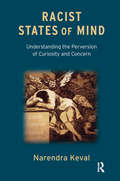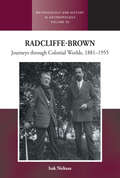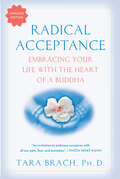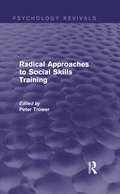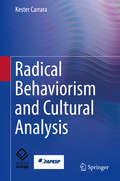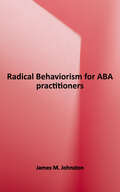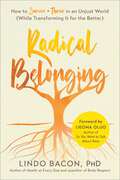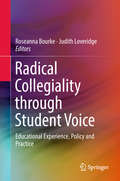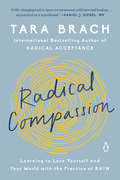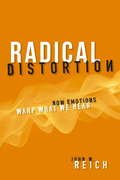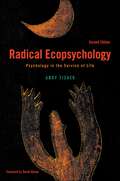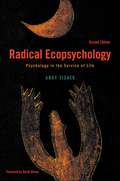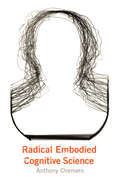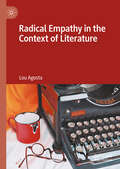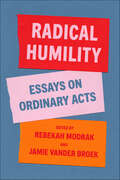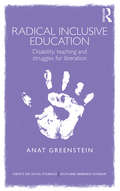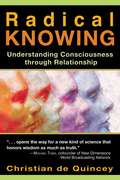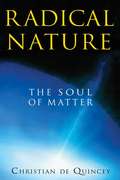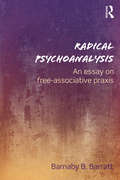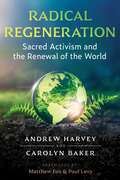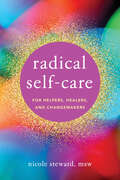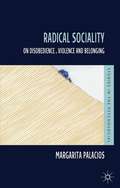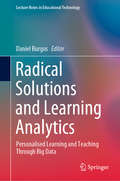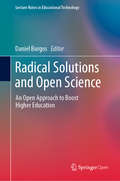- Table View
- List View
Racist States of Mind: Understanding the Perversion of Curiosity and Concern
by Narendra KevalRacism is a treacherous phenomenon with many faces that allow it a remarkable capacity to co-exist with support for ethnic and cultural diversity. In both its subtle and virulent forms, racist states of mind reveal a bewildering mix of anxieties, feelings and fantasies about the real complexities of life and living that a recognition of difference and diversity can potentially bring forth. In this book the author explores the quality of thinking in racist states of mind and suggests that the fantasy dramas of the primal scene provide an essential framework in which racial and racist fantasies exist as deep structures of thought and feeling. These are intrinsic to psychic life and functioning, universally present in contemporary culture as well as the consulting room where they constitute the passions of the transference. The author explores the predicaments and challenges of engaging with these states of mind in the consulting room, group, organisational, and societal life.
Radcliffe-Brown: Journeys Through Colonial Worlds, 1881-1955 (Methodology & History in Anthropology #50)
by Isak NiehausAlfred Radcliffe-Brown (1881-1955) is widely renowned as a founder of modern social anthropology. This biography challenges popular stereotypes of him as a misplaced positivist and colonial conservative. It shows Radcliffe-Brown to be a thoroughly cosmopolitan scholar, a committed fieldworker and a sharp critic of colonialism. Radcliffe-Brown engaged strategically with colonial authorities to further the interests of his discipline and invoked scientific credentials to critique central aspects of colonial rule. His struggle for intellectual autonomy and advocacy of a comparative sociological approach speaks to many contemporary concerns.
Radical Acceptance: Embracing Your Life With The Heart Of A Buddha
by Tara BrachIn our current times of global crises and spiking collective anxiety, Tara Brach&’s transformative practice of Radical Acceptance offers a pathway to inner freedom and a more compassionate world. This classic work now features an insightful new introduction, an exclusive bonus chapter, and additional guided meditations. &“Radical Acceptance offers us an invitation to embrace ourselves with all our pain, fear, and anxieties, and to step lightly yet firmly on the path of understanding and compassion.&”—Thich Nhat Hanh &“Believing that something is wrong with us is a deep and tenacious suffering,&” says Tara Brach at the start of this illuminating book. This suffering emerges in crippling self-judgments and conflicts in our relationships, in addictions and perfectionism, in loneliness and overwork—all the forces that keep our lives constricted and unfulfilled. Radical Acceptance offers a path to freedom, including the day-to-day practical guidance developed over Dr. Brach&’s forty years of work with therapy clients and Buddhist students. Writing with great warmth and clarity, Tara Brach brings her teachings alive through personal stories and case histories, fresh interpretations of Buddhist tales, and guided meditations. Step by step, she shows us how we can stop being at war with ourselves and begin to live fully every precious moment of our lives.
Radical Approaches to Social Skills Training (Psychology Revivals)
by Peter TrowerOriginally published in 1984, one of the few facts that emerged clearly in the beleaguered field of psychology and mental health at the time was the extent of poor social skills in psychiatric patients, the mentally handicapped and problem adolescents. As a result, during the 1970s, social skills training – espoused as a form of behaviour therapy – seemed to offer great promise, based on the notion that social skills, like any other skills, are learnt and can be taught if lacking. However, in evaluating social skills training, many investigators found that skills did not endure and generalise. This book attempts a major re-assessment of social skills training. It examines the underlying paradigms, which are shown to be fundamentally behaviourist. Such paradigms, it is argued, severely constrain the aims and method of current types of training. Thus the book develops what is termed an ‘agency’ approach, based on man as a social agent who actively constructs his own experiences and generates his own goal-directed behaviour on the basis of those constructs. This new model is developed in both theoretical and practical ways in the main body of the book and should, even today, be of great interest to all those involved with social skills training.
Radical Behaviorism and Cultural Analysis
by Kester CarraraThis book shows how the three-term contingency paradigm created by B.F. Skinner can be applied to describe and explain cultural practices phenomena produced by complex relations between behavior and environment. It updates the academic debate on the best paradigm to analyze complex social interactions (contingency or metacontingency), arguing that Skinner’s three-term contingency - the conceptual tool created to analyze human behavior by decomposing it in three parts: discriminative stimulus, operant response and reinforcement/punishment - is the best unit of analysis since what is selected in social interactions are not the actions of the group but of individuals gathered in a group situation to form an articulated and interlocked behavioral practice.The author argues in favor of a relational approach to study behavior and identifies its theoretical foundations in the philosophy of Ernst Mach, especially in Mach’s concept of functional relations and its influence on Skinner. Departing from this theoretical framework, the author argues that behavior can only be studied through the analysis of how it emerges from relations, and cannot be explained by hypothetical constructs such as cognitive maps, personality formation mechanisms, drives, traits and preconceived motivational forces.Radical Behaviorism and Cultural Analysis will be of interest to psychology researchers and students interested in the theoretical foundations of behavior analysis, as well as to social scientists and policy makers from other areas interested in how behavior analysis can be used to study complex social interactions and how it can be applied to build a more fair and sustainable society through cultural planning and the development of prosocial behavior.
Radical Behaviorism for ABA Practitioners
by James M. JohnstonThis edition re-titled Talking About Behavior, continues the first edition's focus on presenting students and practitioners in the field of applied behavior analysis with an engaging introduction to radical behaviorism, the philosophy underlying the field of behavior analysis. Early chapters consider some basic assumptions about the nature of behavior and clarify how we learn to talk about our own behavior and everyone else's. This foundation leads to chapters that discuss a wide range of conceptual issues in a way that shows how they are important to practitioners in their everyday work. Each chapter begins with a vignette that highlights the ways that ABA practitioners experience the misunderstandings about behavior encouraged by everyday dialect. The discussion then focuses on helping readers learn a way of talking about behavior that avoids these conceptual confusions and the problems they can cause for the delivery of behavioral services. The book approaches these topics in an informal and readable style. Pedagogical features include boxes that address special topics that supplement chapter narratives, as well as definitions of key terms and tables summarizing important points. Each chapter ends with a summary of the main points, study guides for text and box content, discussion topics and exercises, suggested readings, and supplementary website readings, which are available on this website. The book concludes with a glossary, bibliography, and indexes. Although the new edition involves the same general organization as the first edition, it includes many significant edits and improvements throughout. One of these is a list of supplementary website readings at the end of each chapter. These readings are newly edited versions of more than 50 blog posts originally published by the author, and the talkingaboutbehavior.com website has been revised to serve as an accompaniment to the text. These readings offer instructors and students opportunities to pursue aspects of each chapter that summarize chapter material, amplify certain points in chapter content, or introduce new topics related to chapter issues.
Radical Belonging: How to Survive and Thrive in an Unjust World (While Transforming it for the Better)
by Lindo Bacon"Belonging has been a formative struggle for me. Like most people with marginalized identities, my experience has taught me that it's hard to be yourself and feel like you belong in a culture that is hostile to your existence. That's why my body of work as a scientist, author, professor, speaker, and advocate for body liberation always comes back to the impact of belonging or not belonging. Radical Belonging is my manifesto, helping us heal from the individual and collective trauma of injustice and support our transition from a culture of othering to one of belonging." —Lindo Bacon Too many of us feel alienated from our bodies. This isn't your personal failing; it means that our culture is failing you. We are in the midst of a cultural moment. #MeToo. #BlackLivesMatter. #TransIsBeautiful. #AbleismExists. #EffYourBeautyStandards. Those of us who don't fit into the "mythical norm" (white, male, cisgender, able-bodied, slender, Christian, etc.)—which is to say, most of us—are demanding our basic right: To know that who we are matters. To belong. Being "othered" and the body shame it spurs is not "just" a feeling. Being erased and devalued impacts our ability to regulate our emotions, our relationships with others, our health and longevity, our finances, our ability to realize dreams, and whether we will be accepted, loved, or even safe. Radical Belonging is not a simple self-love treatise. Focusing only on self-love ignores the important fact that we have negative experiences because our culture has targeted certain bodies and people for abuse or alienation. For marginalized people, a focus on self-love can be a spoonful of sugar that makes the oppression go down. This groundbreaking book goes further, helping us to manage the challenges that stem from oppression and moving beyond self-love and into belonging. With Lindo Bacon's signature blend of science and storytelling, Radical Belonging addresses the political, sociological, psychological and biological underpinnings of your experiences, helping you understand that the alienation and pain you are experiencing is not personal, but human. The problem is in injustice, not you as an individual. So many of us feel wounded by a culture that has alienated us from our bodies and divided us from each other. Radical Belonging provides strategies to reckon with the trauma of injustice; reclaim yourself, body and soul; and rewire your nervous system to better cope within an unjust world. It also provides strategies to help us all provide refuge for one another and create a culture of equity and empathy, one that respects, includes, and benefits from all its diverse peoples. Whether you are transgender, queer, Black, Indigenous or a Person of Color, disabled, old, or fat—or your more closely resemble the "mythical norm"—Radical Belonging is your guidebook for creating a world where all bodies are valued and all of us belong—and for coping with this one, until we make that new world a reality.
Radical Collegiality through Student Voice: Educational Experience, Policy and Practice
by Roseanna Bourke Judith LoveridgeThis book celebrates the rights of the child, through including student voice in educational matters that affect them directly. It focuses on the experiences of children and young people and explores how our educational policies, practices and research endeavours enable educators to help young people tell their own stories. The respective chapters illustrate how listening to young people can help them attain new positions of power, even though doing so often creates discomfort and requires a radical change on the part of the adult establishment. Further, the book challenges researchers, teachers and practitioners to reconsider how students are involved in research and policy agendas, and to what extent radical collegiality can create fundamental and positive changes in the lives of these learners. In recent decades, greater attention has been paid across policy, practice and research discourses to involving children more meaningfully and actively in decisions about their participation in both formal and informal educational settings. The book’s goal is to illustrate how researchers have systematically involved students in the pursuit of a richer understanding of educational experiences, policy and practice through the eyes and ears of young people, and through their own cultural lens.
Radical Compassion: Learning to Love Yourself and Your World with the Practice of RAIN
by Tara BrachOne of the most beloved and trusted mindfulness teachers in America offers a lifeline for difficult times: the RAIN meditation, which awakens our courage and heartTara Brach is an in-the-trenches teacher whose work counters today's ever-increasing onslaught of news, conflict, demands, and anxieties--stresses that leave us rushing around on auto-pilot and cut off from the presence and creativity that give our lives meaning.In this heartfelt and deeply practical book, she offers an antidote: an easy-to-learn four-step meditation that quickly loosens the grip of difficult emotions and limiting beliefs. Each step in the meditation practice (Recognize, Allow, Investigate, Nurture) is brought to life by memorable stories shared by Tara and her students as they deal with feelings of overwhelm, loss, and self-aversion, with painful relationships, and past trauma--and as they discover step-by-step the sources of love, forgiveness, compassion, and deep wisdom alive within all of us.
Radical Distortion
by John W. ReichAn insightful discussion of the social-science research on the decision-making processes to help us overcome the biases that divide us. Our social unity is under attack from extremists on opposite sides of the political spectrum. Often the loudest and most influential public voices today are also the most divisive. Amid the din of conflicting claims, accusations, and counteraccusations, voices of moderation can no longer be heard. Radical speech is creating hazards for civil discourse and even for governance. Under such conditions, how will we ever find common ground to advance the needs of the nation? This psychologist presents answers to this question in this insightful discussion of the social-science research on the decision-making processes of those who endorse extremist beliefs. A key finding of this research is that extremism causes selective hearing and biases our very ability to form objective judgments. In fact, radical speech leads to radical hearing and impedes our willingness to consider moderate viewpoints.Based on these findings, Reich presents seven principles whereby we can reduce or eliminate the toxic influences of extremist rhetoric and selective hearing. These include becoming aware of how emotion affects our judgments, accepting the fact that we live in a diverse society where differing points of view are common, and detecting when extremist rhetoric is designed solely to attack its opponents. If knowledge is power, then the best antidote to toxic speech is increased scientific understanding of how our judgments are formed. By making the latest social-science research on this important subject accessible, Radical Distortion takes a crucial first step toward creating a more civil society.
Radical Ecopsychology, Second Edition: Psychology in the Service of Life (SUNY series in Radical Social and Political Theory)
by Andy FisherPersonal in its style yet radical in its vision, Radical Ecopsychology, Second Edition offers an original introduction to ecopsychology—an emerging field that ties the human mind to the natural world. In order for ecopsychology to be a force for social change, Andy Fisher insists it must become a more comprehensive and critical undertaking. Drawing masterfully from humanistic psychology, hermeneutics, phenomenology, radical ecology, nature writing, and critical theory, he develops a compelling account of how the human psyche still belongs to nature. This daring and innovative book proposes a psychology that will serve all life, providing a solid base not only for ecopsychological practice, but also for a critical theory of modern society. In this second edition, Fisher includes a new preface, a new section looking back at the development of the field since the book's initial publication a decade ago, and a look at the challenges that lie ahead.
Radical Ecopsychology: Psychology in the Service of Life (2nd Edition) (SUNY series in Radical Social and Political Theory)
by Andy FisherA provocative look at the philosophical concepts (and conceits) that underlie what truly is a radical new form of social thought.
Radical Embodied Cognitive Science
by Anthony ChemeroA proposal for a new way to do cognitive science argues that cognition should be described in terms of agent-environment dynamics rather than computation and representation.While philosophers of mind have been arguing over the status of mental representations in cognitive science, cognitive scientists have been quietly engaged in studying perception, action, and cognition without explaining them in terms of mental representation. In this book, Anthony Chemero describes this nonrepresentational approach (which he terms radical embodied cognitive science), puts it in historical and conceptual context, and applies it to traditional problems in the philosophy of mind. Radical embodied cognitive science is a direct descendant of the American naturalist psychology of William James and John Dewey, and follows them in viewing perception and cognition to be understandable only in terms of action in the environment. Chemero argues that cognition should be described in terms of agent-environment dynamics rather than in terms of computation and representation. After outlining this orientation to cognition, Chemero proposes a methodology: dynamical systems theory, which would explain things dynamically and without reference to representation. He also advances a background theory: Gibsonian ecological psychology, “shored up” and clarified. Chemero then looks at some traditional philosophical problems (reductionism, epistemological skepticism, metaphysical realism, consciousness) through the lens of radical embodied cognitive science and concludes that the comparative ease with which it resolves these problems, combined with its empirical promise, makes this approach to cognitive science a rewarding one. “Jerry Fodor is my favorite philosopher,” Chemero writes in his preface, adding, “I think that Jerry Fodor is wrong about nearly everything.” With this book, Chemero explains nonrepresentational, dynamical, ecological cognitive science as clearly and as rigorously as Jerry Fodor explained computational cognitive science in his classic work The Language of Thought.
Radical Empathy in the Context of Literature
by Lou AgostaIn this book, Lou Agosta explains, using literary examples, that readers require radical empathy to relate to, process, and overcome bad things happening to good people (for example: moral and physical trauma, double binds, soul murder, and behavior in extreme situations.) A definition of radical empathy in the context of literature emerges: Empathic distress occurs, but one’s commitment to the Other is such that one empathizes in the face of empathic distress. One’s empathic commitment to the survivor enables the survivor to recover her/his humanness, integrity, and relatedness. This work engages how the impact and cost of empathic distress affect the different aspects of empathic receptivity, empathic understanding, empathic interpretation, and empathic responsiveness, delivering a breakthrough and transformation in relating to the Other. The intersection of literature and empathy is the place in which the literary artwork transfigures the face of trauma, overcoming empathic distress, and allowing radical empathy to enable the fragmented Other to recover her/his integrity. Additionally, the book does not merely tell the reader about radical empathy in the context of the literary art work; it delivers an experience of radical empathy in context in empathy’s receptivity, understanding, interpretation and responsiveness.
Radical Freud: Reconstructing the Bisexuality Thesis
by Thomas OlverRadical Freud reveals a radical dimension to Sigmund Freud's sexual theory that has previously been neglected.Thomas Olver argues that Freud's radical heritage has been transformed into an orthodox school with an internal stasis that is unassailable from within but increasingly challenged from without as irrelevant. Olver offers a return to the radical elements of Freud's work, first by reviewing the ways in which Freud's pioneering sexual theory has been vulgarised since his death, and by recentring his texts. The bisexuality thesis is then reconstructed, based on a close reading of key texts, and contrasted with the better-known Oedipus theory. Olver then explores the philosophical and clinical consequences of this parallel line of sexual theory.Radical Freud will be of great interest to psychoanalysts as well as to academics and scholars of psychoanalytic studies, gender and queer studies, sociology, anthropology, history and philosophy.
Radical Humility: Essays on Ordinary Acts
by Rebekah Modrak and Jamie Vander BroekAn innovative, &“valuable&” collection of essays by Charles M. Blow, Agnes Callard, and more on the personal and civic function of humility (Literature Lust). What does humility mean and why does it matter in an age of golden escalators and multibillionaires? How can the cultivation of humility empower us to see success in failure, to fight against injustice, to stretch beyond our usual ways of thinking, and to foster a culture of listening in an age of digital shouting? With contributions from renowned scholars as well as psychologists, artists, and many others, Radical Humility: Essays on Ordinary Acts offers guidance. Having witnessed the personal and civic costs of narcissism and arrogance, these and other writers consider humility as a valuable process―a state of being―with the power to impact institutions, systems, families, and individuals, and give voice to the ways in which humility is practiced in many ordinary but extraordinary actions. This groundbreaking collection is a thought-provoking read for anyone seeking alternatives to a culture of self-aggrandizing excess. Contributors: Aaron Ahuvia, Russell Belk, Charles M. Blow, Richard C. Boothman, Agnes Callard, Lynette Clemetson, Tyler Denmead, Nadia Danienta, Mickey Duzyj, Kevin Em, Eranda Jayawickreme, Kevin Hamilton, Eranda Jayawickreme, Troy Jollimore, Melissa Koenig, Aric Rindfleisch, Valerie Tiberius, and Ami Walsh
Radical Inclusive Education: Disability, teaching and struggles for liberation (Concepts for Critical Psychology)
by Anat GreensteinMany people who work in education start out with enthusiastic ideals about education as a positive force that can spur change in the life of the learner and in society at large, yet find themselves frustrated with a bureaucratic system that often alienates and excludes many of its students. This is particularly true for students identified as having "special educational needs" (SEN) or disability, a label often used to justify the ways in which students are failed by a system that focuses on narrow definitions of knowledge, seeks to normalise and control behaviour, and values economic productivity over other forms of human activity. Radical Inclusive Education explores how current educational practices, such as standardised tests and league tables, exclude and fail many disabled students, and naturalise educational inequalities around gender, class, ethnicity and ability. Informed by the social model of disability, the book argues that educational theories and practices that are geared towards social justice and inclusion need to recognise and value the diversity of human embodiments, needs and capacities, and foster pedagogical practices that support relations of interdependency. The book draws on work in disability studies, critical psychology and critical pedagogy, and also real life examples from interviews with activists in the disabled people’s movement, and from research in a school, to offer examples of what radical inclusive education – that is sensitive to the needs of all students – might look like in practice. As such, it will be of great interest to practitioners and students in the field of education, particularly for those interested in SEN and disability, sociology of education, critical pedagogy, informal education and social movement learning.
Radical Knowing: Understanding Consciousness through Relationship
by Christian De QuinceyA radical reassessment of what we mean by "consciousness" and how we experience it in relation to others • Shows the importance of integrating different ways of knowing--such as feeling and intuition, reason and the senses--in our approach to life • Discusses the technique of Bohmian Dialogue where you can learn not only to "feel your thinking," but also to experience true communion with others In Radical Knowing Christian de Quincey makes a provocative claim: We are not who we think we are. Instead, we are what we feel. Giving disciplined attention to feelings reveals the most fundamental fact of life and reality: We are our relationships. Most of us think we are individuals first and foremost who then come together to form relationships. De Quincey turns this "obvious fact" on its head and shows that relationship comes first, and that our individual sense of self--our "private" consciousness--actually arises from shared consciousness. This shared, collective consciousness is at the heart of indigenous ways of life and their worldviews. De Quincey explains that participating in shared consciousness literally builds the fabric of reality, and that understanding this process is key to unlocking our potential for higher consciousness and spiritual evolution. He presents the technique of Bohmian Dialogue, developed by groundbreaking quantum physicist David Bohm, as one method for experiencing this powerful process. He also explores the mystery of synchronicity, offering a new understanding of the relationship between matter and mind and the underlying nature of reality.
Radical Nature: The Soul of Matter
by Christian De QuinceyAn exploration of consciousness in all matter--from quantum to cosmos • Outlines theories of consciousness in ancient and modern philosophy from before Plato to Alfred North Whitehead • Reveals the importance of understanding mind-in-matter for our relationships with the environment, with other people, even with ourselves Are rocks conscious? Do animals or plants have souls? Can trees feel pleasure or pain? Where in the great unfolding of life did consciousness first appear? How we answer such questions can dramatically affect the way we live our lives, how we treat the world of nature, and even how we relate to our own bodies. In this new edition of the award-winning Radical Nature, Christian de Quincey explores the “hard problem” of philosophy--how mind and matter are related--and proposes a radical and surprising answer: that matter itself tingles with consciousness at the deepest level. It’s there in the cells of every living creature, even in molecules and atoms. Tracing the lineage of this idea through Western philosophy and science, he shows that it has a very noble history--from before Plato to Alfred North Whitehead. He reveals that the way to God is through nature and that understanding how body and soul fit together has surprising consequences for our relationships with our environment, with other people, and even with ourselves.
Radical Psychoanalysis: An essay on free-associative praxis
by Barnaby B. BarrattOnly by the method of free-association could Sigmund Freud have demonstrated how human consciousness is formed by the repression of thoughts and feelings that we consider dangerous. Yet today most therapists ignore this truth about our psychic life. This book offers a critique of the many brands of contemporary psychoanalysis and psychotherapy that have forgotten Freud's revolutionary discovery. Barnaby B. Barratt offers a fresh and compelling vision of the structure and function of the human psyche, building on the pioneering work of theorists such as André Green and Jean Laplanche, as well as contemporary deconstruction, feminism, and liberation philosophy. He explores how ‘drive’ or desire operates dynamically between our biological body and our mental representations of ourselves, of others, and of the world we inhabit. This dynamic vision not only demonstrates how the only authentic freedom from our internal imprisonments comes through free-associative praxis, it also shows the extent to which other models of psychoanalysis (such as ego-psychology, object-relations, self-psychology and interpersonal-relations) tend to stray disastrously from Freud's original and revolutionary insights. This is a vision that understands the central issues that imprison our psychic lives - the way in which the reflections of consciousness are based on the repression of our innermost desires, the way in which our erotic vitality is so often repudiated, and the way in which our socialization oppressively stifles our human spirit. Radical Psychoanalysis restores to the discipline of psychoanalysis the revolutionary impetus that has so often been lost. It will be essential reading for psychoanalysts, psychoanalytic psychotherapists, mental health practitioners and students and academics with an interest in the history of psychoanalysis.
Radical Regeneration: Sacred Activism and the Renewal of the World
by Andrew Harvey Carolyn Baker• Explores how Sacred Activism--specifically, creative, wise, sacredly inspired action--offers an antidote to the crises facing our world• Reveals how to uncover and sustain joy and how to use it as fuel for continuing Sacred Activism in dangerous times• Includes practical maps of the dark night process and of the four-part path to transfiguration drawn from the secret depths of the mystical traditionsPresenting a manual for navigating humanity&’s collective dark night, Andrew Harvey and Carolyn Baker explore potential antidotes, drawn from mystical traditions and Sacred Activism, to help us find inspiration and take action in the face of the daunting challenges to our world. Offering a deep discussion of our global dark night in terms of the Kali Yuga, the authors examine the dangers of a growing constellation of intractable crises--authoritarianism both in America and abroad, climate change, economic inequality, social upheaval, and spiritual malaise. They then explore the antidotes to these crises: Sacred Activism--specifically, creative, wise, sacredly inspired action--and a profound understanding of our evolutionary ordeal and its potentialities. Examining the power of joy to help enact personal and planetary transformation, they explain how joy, or ananda, is a force all mystical traditions recognize as the essence of the Divine. They reveal how to uncover and sustain joy in ourselves and how to use joy as fuel for continuing Sacred Activism in dangerous times. Drawing on the visionary teachings of mystics such as Pierre Teilhard de Chardin and Sri Aurobindo, the authors show how the global dark night is part of an evolutionary mutation process and how its very intensity makes it the potential seedbed of a new embodied, divine humanity. They offer practical maps of the crises, of the shadows that this global dark night is casting, and of the four-part path to transfiguration drawn from mystical traditions. Sharing a vision of a new and focused global moment of love in action, the authors reveal that apocalypse is not inevitable--if enough people awaken to the extraordinary possibilities of Sacred Activism.
Radical Self-Care for Helpers, Healers, and Changemakers
by Nicole StewardSolutions for tackling the deeply-rooted causes of burnout. Radical Self-Care for Helpers, Healers, and Changemakers addresses the constant exposure to heartbreak and injustice that can take a toll on the mental and physical health of those in the helping professions. After more than twenty years as a social worker, author Nicole Steward shares her own challenges with burnout and offers practical solutions to tackle the deeply-rooted causes of overwhelm that helpers face, which include compassion fatigue, vicarious trauma, and moral injury. Steward’s solutions go beyond mere stress-reduction techniques; rather, she offers a framework for engaging in radical self-care. Here readers will discover a way of being that prioritizes helpers and healers, so they can better serve others without sacrificing their own health and wellness. This book offers foundational strategies that challenge the current systems that contribute to the high rates of burnout and turnover in the human and social service professions. By taking radical care of themselves, helpers can take a more effective and resilient approach to their work, ultimately leading to liberation for both themselves and those they serve.
Radical Sociality
by Margarita PalaciosA philosophical and psychoanalytic investigation of relations to otherness, violence, disobedience and belonging, Radical Sociality explores the possibilities and vicissitudes of contemporary forms of belonging and the limits and challenges of democracy.
Radical Solutions and Learning Analytics: Personalised Learning and Teaching Through Big Data (Lecture Notes in Educational Technology)
by Daniel BurgosLearning Analytics become the key for Personalised Learning and Teaching thanks to the storage, categorisation and smart retrieval of Big Data. Thousands of user data can be tracked online via Learning Management Systems, instant messaging channels, social networks and other ways of communication. Always with the explicit authorisation from the end user, being a student, a teacher, a manager or a persona in a different role, an instructional designer can design a way to produce a practical dashboard that helps him improve that very user’s performance, interaction, motivation or just grading. This book provides a thorough approach on how education, as such, from teaching to learning through management, is improved by a smart analysis of available data, making visible and useful behaviours, predictions and patterns that are hinder to the regular eye without the process of massive data.
Radical Solutions and Open Science: An Open Approach to Boost Higher Education (Lecture Notes in Educational Technology)
by Daniel BurgosThis open access book presents how Open Science is a powerful tool to boost Higher Education. The book introduces the reader into Open Access, Open Technology, Open Data, Open Research results, Open Licensing, Open Accreditation, Open Certification, Open Policy and, of course, Open Educational Resources. It brings all these key topics from major players in the field; experts that present the current state of the art and the forthcoming steps towards a useful and effective implementation. This book presents radical, transgenic solutions for recurrent and long-standing problems in Higher Education. Every chapter presents a clear view and a related solution to make Higher Education progress and implement tools and strategies to improve the user’s performance and learning experience. This book is part of a trilogy with companion volumes on Radical Solutions & Learning Analytics and Radical Solutions & eLearning.
